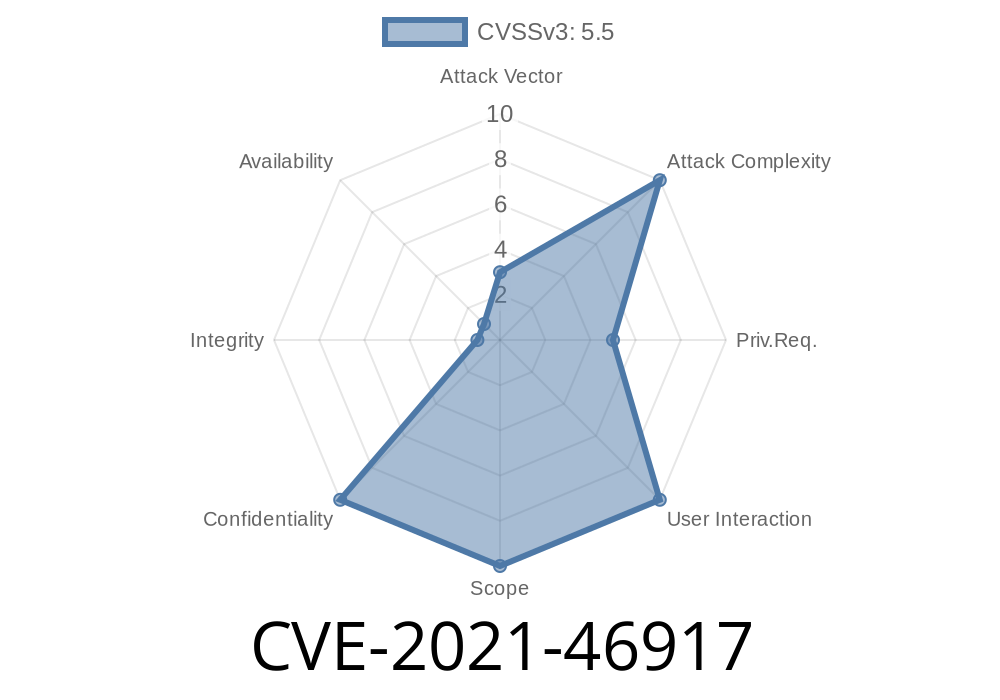In early 2021, security experts uncovered a subtle vulnerability in the Linux kernel, specifically within the dmaengine subsystem, touching Intel's Data Streaming Accelerator (idxd) driver. The flaw, now tracked as CVE-2021-46917, relates to how the driver handles cleanup of *Work Queue Configuration* (WQCFG) registers. While easily overlooked, mishandling these registers can result in unpredictable device behavior, compromise system stability, or potentially expose confidential data.
This article dives deep into the CVE: what happened, how it was fixed, and why it matters. We’ll walk through the original flawed code, the improved patch, and discuss how attackers might have exploited the situation, all explained in straightforward terms.
Background: dmaengine, idxd, and WQCFG
The dmaengine subsystem in Linux lets hardware perform memory-to-memory copying and other data offload tasks. *idxd* stands for Intel Data Streaming Accelerator driver, which aims to accelerate such operations. It manages *work queues*—units of work submitted for hardware acceleration.
Each queue's configuration lives in a *WQCFG* register. Properly zeroing these registers is critical when resetting queues to prevent leftovers from the previous operations.
The Vulnerability: “Blasting the MMIO Region”
While prepping Linux code for future hardware, kernel engineers needed to accommodate some pre-release silicon that didn’t reset WQCFG registers correctly. The quick-and-dirty fix involved manually zeroing (i.e., "blasting") a region of memory mapped I/O (MMIO) registers. Unfortunately, this logic slipped into the public Linux kernel, bypassing the intended hardware-level reset mechanism.
Overwriting these registers directly isn’t safe—especially as *future* Intel hardware might not expect it, leading to undefined behavior or device corruption.
Here’s what the original, problematic code did, simplified for clarity
// Inside idxd driver cleanup
void clean_wqcfg_mmio(struct idxd_wq *wq)
{
void __iomem *wqcfg_base;
wqcfg_base = idxd_wq_get_wqcfg(wq);
memset_io(wqcfg_base, , sizeof(struct idxd_wqcfg));
// "Blasting" the MMIO region, not using hardware reset
}
This memset_io approach manually zeros out the whole register. However, this assumes details about hardware internals that may change.
The Safe Fix
The proper way to reset a queue is to use the hardware reset command. Here’s how the patched code looked:
void idxd_wq_reset(struct idxd_wq *wq)
{
// write reset command to WQ's command register
writel(WQ_CMD_RESET, wq->wqcmd);
// Wait for reset to complete...
}
Instead of writing zeroes, the driver instructs the hardware to clean up after itself, letting new silicon (with fixed bugs) behave as it should.
Exploit Potential
The vulnerability does not allow a remote attacker to break into your system directly. However, in an environment where untrusted users can submit work to hardware queues, the incorrect cleanup process could:
- Leak leftovers: Data from old jobs could persist in WQCFG, leading to information disclosure between different users or virtual machines.
- Cause device instability: Writing zeros to the wrong regions on newer hardware might clobber important settings, potentially triggering kernel panics, device hangs, or worse.
- Set up for future privilege escalations: Any bug in device register cleanup increases risk for future, more hazardous flaws.
Attacker logs out; kernel does a manual memset_io instead of instructing hardware to reset.
4. Next user gets a now-recycled queue, and with a crafted job, might read back remnants in the WQCFG area.
The Patch and Resolution
The solution landed in Linux kernel 5.13 and relevant stable backports in early May 2021. The mainline commit can be reviewed at:
- https://git.kernel.org/pub/scm/linux/kernel/git/torvalds/linux.git/commit/?id=d1cb2971b52
Summary:
> Use wq reset command instead of blasting the MMIO region. This also addresses an issue where we clobber registers in future devices.
The kernel stable release notes confirm the CVE
- https://www.kernel.org/pub/linux/kernel/v5.x/ChangeLog-5.13
References
- Linux Kernel Commit d1cb2971b52 ("dmaengine: idxd: fix wq cleanup of WQCFG registers")
- CVE-2021-46917 on NVD
- Linux Kernel 5.13 Changelog
- Intel Data Streaming Accelerator documentation
Conclusion
CVE-2021-46917 is a nuanced kernel bug—a quiet reminder that “shortcuts” for early hardware should *never* persist upstream. Relying on hardware-provided reset flows is both safer and more future-proof. As Linux grows to support more complex acceleration hardware, such attention to cleanup, isolation, and legacy scars will only get more important.
If you’re running kernels with Intel idxd devices, update! Even if you’re not using multiple users or virtual machines now, good hygiene means staying ahead of surprises.
*This article is for educational purposes. For the latest security status, read your distribution advisories and kernel release notes.*
Timeline
Published on: 02/27/2024 07:15:08 UTC
Last modified on: 04/10/2024 14:43:21 UTC
